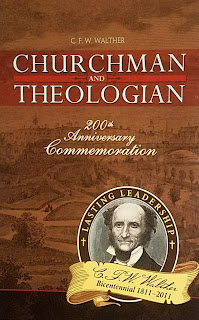Years ago I read from a respectable LC-MS theologian that in his view the first president of the Lutheran Church Missouri Synod, C.F.W. Walther, was severe in his piety (his reverential sense of holiness, his experiential sense of Christian spirituality was extreme). Thus, this theologian diagnosed Walther as a pietist. This is derogatory. It said that Walther -- who was a great and orthodox theologian -- was not orthodox in his sanctification and that a problematic subjectivism overshadowed his objective reliance upon Christ alone. All of this is the baggage that goes into the problem of pietism when pious thoughts, feelings, and intuitions drive faith. When this happens, eyes of faith are taken off of the Lord Jesus Christ and are cast upon one's own religious experience. Talk about sinking sand!
Was this Walther?
The claim didn't settle well with me. I decided to take up Walther's works and ask myself as I read them, "How does Walther understand Christian sanctification?" Results: Walther was not in his core doctrine and practice a pietist.
One of Walther's emphases in teaching on Christian sanctification is the reality of the battle or the struggle between the sinful nature/the flesh on the one hand, and the born-again spirit/new creation on the other. The Christian is both and these two sides are in conflict with each other (Gal 5). Walther was brilliant in his teaching that this battle is in itself basic to sanctification.
This work yielded the following highlights on Christian sanctification that C.F.W. Walther knew:
- The proper order between faith and good works;
- The necessity of good works in the life of the Christian;
- The new life that faith produces;
- The spiritual battle leading to the mortification of the flesh;
- The feeling of anguish and despair that maintains humility; and
- The basic discipline against living in unrepentant, deliberate sin, which would otherwise destroy faith.
The book published by CPH is C.F.W. Walther: Churchman and Theologian (2011). My essay is "C.F.W. Walther on Sanctification."

No comments:
Post a Comment